The festive season is upon us and along with the baubles and treats, the lights and the décor and rich, tasty eats, for many people the holidays present an especially good time to curl up with a book.
Find out what faculty and staff, students and alumni are looking forward to reading this holiday season, and which books made their list of festive classics.
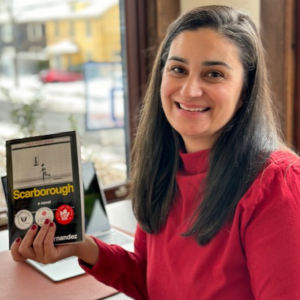
Nadia Aumeerally
Student, MFA in Fiction, Class of 2025
Scarborough by Catherine Hernandez
Over the holidays I plan to read Scarborough by Catherine Hernandez. It has been on my to-read list for awhile and I am excited to spend some time savouring this award-winning novel. tells the story of a culturally diverse neighbourhood whose inhabitants struggle with poverty, addiction and crime. The story is told from multiple points of view—a style I particularly enjoy. I look forward to ‘meeting’ the inhabitants of one of Canada’s largest and most multicultural neighbourhoods. ![]()
 Jonna Brewer
Jonna Brewer
BJ(Hons)’87, journalist
Do You Remember Being Born? by Sean Michaels
I love Christmas and am eager to kick back and enjoy relaxing times with my family.
Closely matching my excitement for the holidays is reading Sean Michaels’ latest novel, Do You Remember Being Born? It’s the story of a 75-year-old poet hired by a tech company to work with its poetry AI named Charlotte. I’m intrigued of course by the timely theme, but being a fan of Sean Michaels’ previous works (including the Giller Prize-winning Us Conductors), and having had the great fortune of interviewing him, I know he’ll take the story in surprising, clever and thought-provoking directions.
Happy holidays to all and happy reading! ![]()
 Nancy Dutra
Nancy Dutra
Student, MFA Creative Nonfiction, Class of 2025, and writer, SOCAN Words and Music Magazine
The Santaland Diaries by David Sedaris
A Mind Spread Out on the Ground by Alicia Elliott
I enjoy reading (and listening to) The Santaland Diaries by David Sedaris every holiday season. Sedaris’ hilarious stint working as one of Santa’s elves at a Macy’s department store puts me in both a festive and curmudgeonly mood—the perfect Christmas cocktail. This year, I’m also making time to read Alicia Elliott’s memoir A Mind Spread Out on the Ground, about Elliott’s experience living with depression. This memoir was recommended to me by Kim Pittaway, my Cohort Director at King’s, as a book that may inform my memoir project. I’m looking forward to learning from Elliott, a Haudenosaunee writer, and seeing how she deftly explores various states of mind in connection to wide-ranging topics such as race, colonialism, poverty, parenthood, and writing and representation in the literary world. I’ve only read the titular essay thus far. I find Elliott’s wit caustic and her prose powerful. ![]()
 Bill Lahey
Bill Lahey
University of King’s College President and Vice-Chancellor
The Boys in the Boat by Daniel James
Over the holidays I’ll be finishing The Boys in the Boat, by Daniel James Brown, published by Penguin Books in 2013.
I love good books on sports and this one caught my eye when I recently saw the trailer for the just released film version. The Boys in the Boat is the story of the varsity rowing team at the University of Washington that won the gold medal for eight-oar crew at the 1936 Berlin Olympics. I am a big believer in what competitive sports can add to a holistically transformative undergraduate education: hence my very faithful attendance at as many Blue Devils’ games as I can fit into my schedule. This is a big part of what Brown writes about, largely through how the Washington crew of 1936 came to epitomize the perfect harmony and synchronization that is needed in a championship boat between all rowers, between the crew and their boat and between the “swing” of the crew and the water. A good deal of this is found in how the book uses the rowing wisdom of George Yeoman Pocock, the working class master builder who meticulously handcrafted the wooden boats in which the Washington crew raced, as a recurring source of meditation on how nine amateur student athletes living in depression era poverty, some of whom learned rowing as university students, won at the Olympics against long odds by becoming, like any truly great team in any sport, something beyond and greater than the sum of their parts. Among other choice tidbits are Pocock’s explanation for how rowing endurance had to come from the mind and the heart as well as the body and his advice to the book’s primary protagonist, that he had to row for his teammates if he aspired to row with them in a championship crew.
The bonus is that I will get to watch the film shortly after finishing the book on one of my holiday outings to the movies—always a favourite part of my holiday season.![]()
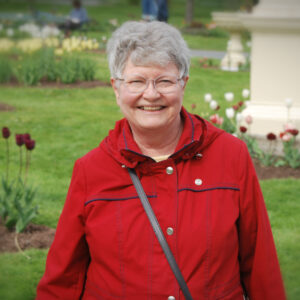 Lois Miller
Lois Miller
BA(Hons)’65
The Adversary by Michael Crummey
I love reading and listening to good storytellers. This year my holiday reading list includes a book by an excellent Canadian storyteller: Michael Crummey’s recent novel, The Adversary. A few weeks ago I heard a snippet of a CBC radio interview with Crummey, who described how he had “shamelessly pillaged” [his words] A Classical Dictionary of the Vulgar Tongue by Francis Grose. It’s a dictionary of eighteenth-century English slang, the language of ordinary people.
I enjoy learning old languages. At King’s I studied Latin and Anglo-Saxon, and currently I am learning Scottish Gaelic. I’m excited to see how Crummey enlivens his dialogue with the language of eighteenth-century English working people, transferred to Newfoundland.
Murder mysteries make up my pleasure-reading. Just for fun, this holiday season I may re-read the Agatha Christie classic Hercule Poirot’s Christmas. If I am asked to read a story aloud, I’ll pick my all-time favourite holiday story, “Dave Cooks the Turkey” by the late, great Canadian storyteller Stuart McLean (Home from the Vinyl Cafe, 1998). I read it once to a mixed audience to great hilarity. Like Stuart sometimes, I could barely keep from laughing enough to complete the story. ![]()

Kathryn Morris
Director, Early Modern Studies Program, Assistant Professor of Humanities
The Maniac by Benjamín Labatut
There’s always a lot of chaos and cooking in the lead-up to Christmas, so I do my best holiday reading on Boxing Day – a day for new books and leftovers. I plan to spend this December 26 on the sofa with my dog, a tin of Quality Street, and Benjamín Labatut’s The Maniac. I loved When We Cease to Understand the World, Labatut’s genre-defying (he calls it “a work of fiction based on real events”) exploration of modern mathematics and physics. In The Maniac, he turns to the life and times of John von Neumann (1903-57), a Hungarian polymath who worked on the Manhattan project and created a theoretical model of a self-replicating machine. If the spectres of nuclear Armageddon and AI takeover get too grim, I plan to crack Samara Breyer’s A Long Time Dead. Because nothing says festive like a 400-page Victorian vampire romance! ![]()
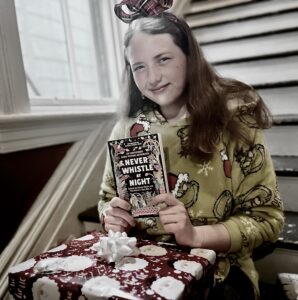 Emily Pictou-Roberts
Emily Pictou-Roberts
BA(Hons)’20, Indigenous Support and Outreach Coordinator
Never Whistle At Night: An Indigenous Dark Fiction Anthology, Eds. Shane Hawk & Theodore C. Van Alst Jr.
Over the holiday break, I am excited to share a few spooky stories with my family by the fire from Never Whistle at Night: an Indigenous Dark Fiction Anthology, (ed. by Shane Hawk and Theodore C. Van Alst Jr.)
Growing up Mi’kmaw, I’ve always known to “Never Whistle at Night.” We often heed the warning yet rarely explain the consequences—for good reason. No one is safe: they will find you.
If you are brave enough, the anthology is available in the King’s Co-op Bookstore for purchase. But please, whatever you do, Never Whistle At Night! ![]()
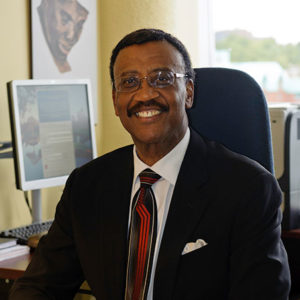 Douglas Ruck, KC
Douglas Ruck, KC
BA’72, Chair of King’s Board of Governors
How to Say Babylon: A Memoir by Safiya Sinclair
I look forward to reading How to Say Babylon: A Memoir by Safiya Sinclair, an author I only became aware of earlier this year. Quite by accident, I came upon a reference to her collection of poems titled Cannibal. Her poems call out and confront Shakespeare’s The Tempest, its portrayal of Caliban (an anagram for the word canibal in Spanish), and the issues associated with postcolonial identity. Her writing is mesmerizing; she draws us into her memories while causing us to reflect upon our own memories and sense of home.
I had been looking for more of her work and was delighted to learn she had released her memoir in October of this year. She won the Goodreads Choice Award for Best Memoir & Autobiography (2023). Her work was described as “How to Say Babylon is Sinclair’s reckoning with the culture that initially nourished but ultimately sought to silence her; it is her reckoning with patriarchy and tradition, and the legacy of colonialism in Jamaica.” I’m hopeful she has captured the same vibrancy and exploration of language in her memoir as she did with her poetry.
A series I have often read during the holidays and would strongly recommend is that of the much-missed storyteller extraordinaire Stuart McLean’s Vinyl Cafe. I am particularly fond of the story Dave Cooks the Turkey. No matter how often I have read or heard the story, it remains an enjoyable laugh-out-loud read. Undoubtedly, partly because of my misadventures when given a similar responsibility. ![]()
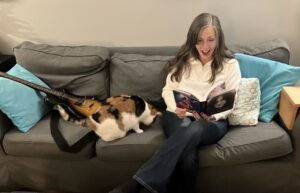
Gillian Turnbull
Director of Writing and Publishing
My Effin’ Life by Geddy Lee
I’ll confess that I’ve given my entire December over to Geddy Lee. His memoir, My Effin’ Life, came out November 14 and his new show, Geddy Lee Asks: Are Bass Players Human Too, started December 5. I started listening to the audiobook right away, thrilled to have his reading voice accompany me on walks after years of Rush being a fixture on my workout playlists (I was once so intent on listening to them while jogging I fell and broke my arm). But because my ticket to his live Q&A includes a copy of the book, I plan to re-read the hardcover as soon as it’s in my hands. My partner and I, united in our love of Rush, have a tradition of putting on one of their live shows while we cook Christmas dinner. This year will be made all the sweeter by remembering our favourite parts of the book. It’s a banner year for music memoirs, but Geddy’s tops my list; he’s a model for any nonfiction writer with his in-depth, rigorous research and strong voice (in more ways than one!) anchoring this beautiful life story. This book tells us that memoirs are not simply an exercise in writing down your favourite memories, even if you’re a beloved celebrity. They require intensive research, finding a compelling story arc, and making your life relatable to your readers. ![]()

Fred Vallance-Jones
Director of Journalism, Associate Professor of Journalism
Dominion: The Railway and the Rise of Canada by Stephen Bown
I would recommend Dominion: The Railway and the Rise of Canada by Stephen Bown. It is about the construction of the Canadian Pacific Railway, but it is not another National Dream-style epic. Instead, it dives deeply into the impact of white settlement and the railway on Indigenous peoples and on the Chinese labourers who were brought in to build the westernmost section of the CPR. It smashes a few myths about Canada along the way and is a pretty breezy read. It has a rather sudden and abrupt ending that is a bit unsatisfying, but for anyone interested in how we got to where we are, and about the actual legacy of Sir John A Macdonald, it’s worth a look. ![]()

